HIT CHANNEL EXCLUSIVE INTERVIEW: March 2025. We had the great honor to talk with a very talented musician: Peter Albin. He is most well-known as the bass player and founding member of the legendary Big Brother and the Holding Company along with Janis Joplin. He performed with them at Monterey Pop Festival in 1967 and has also been a member of Country Joe and the Fish and Dinosaurs. BBHC are going to tour in 2025. Read below the very interesting things he told us:
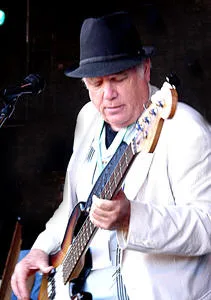 What are the projects you are currently involved with?
What are the projects you are currently involved with?
Musically, I’m involved with the Big Brother and the Holding Company group still. We’ve been playing for over 50 years now. We have the original drummer, Dave Getz, who I think you ‘ve been interviewed and then we have a bunch of younger people in the 40s and 50s (laughs), who are playing with us. Darby Gould (Jefferson Starship) is our singer and our main guitar player is Tom Finch. We still play about once every two or three months. I play with a group called The Irish Newsboys, which is a group of chronicle reporters who are Irish and we do Irish music. Then, I play with a group called The Barry Melton Band and Barry (guitar) was from the Country Joe and the Fish band and we have a bunch of people at our age in the band. Then, I play ukulele with a ukulele group that’s from a senior center close by.
What should fans expect from the upcoming tour dates of Big Brother and the Holding Company?
Well, we play most of the older songs from the “Cheap Thrills” (1968) album and the first album (ed: “Big Brother and the Holding Company” -1967), the Mainstream record. We also do a few new songs and we do a medley. Darby Gould, is the singer here in the West Coast and when we go to the East Coast is Sophia Ramos, a gal from New York.
In your opinion what makes the music of Big Brother and the Holding Company still relevant in 2025?
That’s a good question! I’m not sure what makes it relevant, to tell you the truth. I think our audience is not a bunch of old people, is a bunch of daughters and sons of people who are our fans, but they listen to the music of their parents and they got turned on. So, we have an audience sometimes of people in their 20s and 30s and they like the old music.
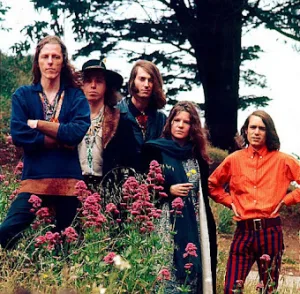 Could we say that Monterey Pop Festival (1967) was the catalyst for the career of Big Brother and the Holding Company?
Could we say that Monterey Pop Festival (1967) was the catalyst for the career of Big Brother and the Holding Company?
Yes, it was. We had played a couple of gigs before the festival, but after the festival we did a lot more touring. Even after the band had lost Janis Joplin and we took off for about 10 years, when we got back together again, we did a lot more touring and we toured all over Europe and we toured even to Thailand, Japan and several places around the world. We had a great deal of touring. It definitely slowed down.
Are you proud that “Cheap Thrills” (1968) is considered a classic album?
Yeah, I’m pretty proud of that. It’s an odd album, in a way. It started out to be a live record, including recordings that we did at the Grande Ballroom in Detroit and also the Winterland venue in San Francisco. But we discovered that a lot of parts were bleeding into other channels, so, we went back into the studio and recorded a lot of the material that we had done live. We added some people, like a party, every once in a while we had people in the studio, but it was mostly studio recordings. I think the only real live recording on the record is “Ball and Chain”.
I really like your playing in “Down on Me” (from the debut album). Please tell us a few words about this.
Well, it’s an old southern gospel song and we got it from an old recording and we just figured out how to make it into a rock ‘n’ roll type of tune by adding things like bass and drums. Before, it was basically like a choir in the church. So, we tried to make it into a rock ‘n’ roll song and it works (laughs). We get asked for, every once in a while and it’s one of the main older songs that we include in every show that we do.
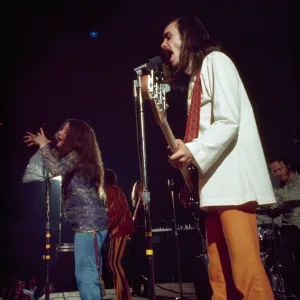 Your bass lines in this were quite heavy at that time. What was your approach to this?
Your bass lines in this were quite heavy at that time. What was your approach to this?
I don’t know. I’m from a bluegrass background, playing guitar, not bass, but when we played we didn’t have a bass player, so, a lot of the bass lines were done by me on guitar. So, it was easy for me the transition to a bass. Of course, I had to learn a lot, because I wasn’t initially a bass player, but it was pretty easy for me to do that, instead of just playing guitar all the time. I would trade off: Sometimes Sam (ed: Andrew -guitar) would play bass and I would play guitar.
Were you frustrated when some journalists criticized the musical abilities of the members of Big Brother and the Holding Company?
I kind of agree with them (laughs), because we were just starting out and later on, in the ‘80s and ‘90s and now, we play a lot better and we have a lot better people playing with us, too, I think. It just takes time to get these skills and perform well. But back then, it was crazy underground rock ‘n’ roll and we could do crazy things and not necessarily sound like we were professional musicians. We sounded like we were amateurs; in some ways we were. We were just starting out.
Was Janis Joplin an easy-going person to work with?
Musically, she was excellent. It was a joy to work with her. Usually, when she did a part, let’s say, for a recording, she was able to do it over and over again the same way. The guys in the band, we would just do things differently every take (laughs) and it was very frustrating for the producer. You can talk to John Simon (The Band, Leonard Cohen) who did the “Cheap Thrills” record and he was frustrated with the band, but not with Janis. She was very professional and we were just doing our improvisational thing that was very much the vogue in the ‘60s. If you take a little bit of drugs every once in a while, that some of the band members did, (ed: he shouts in an amusing way) not me, of course, but just the other people, then, it would be very expressive but different every time to do the same song. It was crazy.
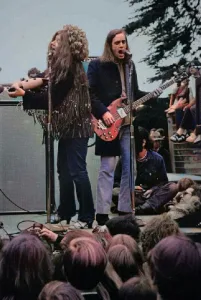 Was there any tension within the band when Janis achieved a rock star status?
Was there any tension within the band when Janis achieved a rock star status?
Not really. We felt it was going to happen, particularly after the Monterey Pop Festival. We knew that it was the beginning of the end. She got a lot of publicity and a lot of attention by managers and record companies and we hadn’t even done “Cheap Thrills” yet. So, when we went to New York and recorded that, along with the live recordings, then, the manager at the time, Albert Grossman (ed: Bob Dylan manager) read us the riot act and he brought us into his office and complained about how we couldn’t do the same thing twice the same way (laughs). Yeah, he wanted to replace me and Dave (ed: Getz -drums) on the “Cheap Thrills” record but the rest of the band said: “No, we can’t do that”. So, after the recording became a hit, I mean, it was on Billboard charts at #1 for six weeks, which I thought was pretty good, we were doing some touring and at that point, Janis decided to leave the band and start her own group and it was ok. We understood that it was gonna happen.
How much has your approach to bass changed over the years?
It’s gotten worse (laughs). As I get older, I start forgetting parts in the songs that we played for years, but, actually, it’s still fun.
Who are your influences as a bass player?
I like listening to a lot of the old blues tunes from the Chicago bands and some even older groups. Contemporary people, I like a lot of the bass players that I hear today and I like a lot of the jazz bass players from the ‘40s, ‘50s and ‘60s. I can’t really name any particular one because I listen to a lot of them. I don’t try to do Jaco Pastorius (laughs), he was too much. Some of the modern jazz bass players are fantastic and I will listen to them. On the radio, I listen to a classical music station and a jazz station, most of the time. So, when I listen to bass players, it’s mostly jazz players.
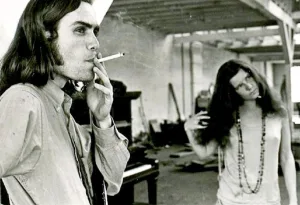 How important was the contribution of Bill Graham (legendary promoter and owner of Fillmore East, Fillmore West and Winterland venues) in the San Francisco scene?
How important was the contribution of Bill Graham (legendary promoter and owner of Fillmore East, Fillmore West and Winterland venues) in the San Francisco scene?
Well, he was extremely important, but so was Chet Helms, who was our manager and was the head of the Family Dog venue. Bill was pretty important to a lot of the bands in that he was critical. He just didn’t bring on all the bands that came out of San Francisco. He would listen to them and he brought in a lot of bands from outside of San Francisco and combined them with some of the local bands that he liked, but for a long time, for example, he didn’t have Sly and the Family Stone on, he thought they were strange, but later he heard them and liked them and had them play at the Fillmore and the Winterland. There were a lot of other bands that were just starting out in the ‘70s that it took a while before they got to play for Bill Graham, but a lot of them played for Chet Helms in the Family Dog.
Is it a coincidence that all the San Francisco bands had very strange names (Big Brother and the Holding Company, Country Joe and the Fish, Jefferson Airplane, Grateful Dead)?
I don’t know why everybody picked funny names, so did we. We had a large list of strange names, actually, we had two lists: One list had The Holding Company, which referred to people holding drugs and the other one had Big Brother, which referred to “1984” novel (ed: by George Orwell) and we just put them together. We did that because other bands had strange names, so, we wanted to be part of the scene. So, we had a weird name. A lot of people said it’s too long for posters and whatever, to have these six words, but anyway, it was fun, picking them up.
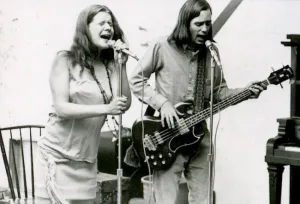 Do you like other bass players from your era such as Phil Lesh (Grateful Dead) and Jack Casady (Jefferson Airplane)?
Do you like other bass players from your era such as Phil Lesh (Grateful Dead) and Jack Casady (Jefferson Airplane)?
Oh sure, yeah. There were a lot of great bass players here in the Bay Area and Jack is one of them. Jack, I want to say, was very influential listening to how he played and the fact that he was a friend. I could go over his house and he would turn me on to different records and music that he liked and we even jammed a little bit together. I’ve been on the same bill with him and the Jefferson Starship and the Jefferson Airplane several times and he’s still a friend.
Do you remember the two shows you played in Athens in 2009?
Yes, one city was Athens and the other one was Thessaloniki, by the water and that was fun. We did a radio show there, too. I think Sam was involved in an interview. Yeah, it was fun.
How did you come up with the idea to form Dinosaurs with John Cipollina (Quicksilver Messenger Service -guitar, vocals), Barry “The Fish” Melton (Country Joe and the Fish -guitar) and Spencer Dryden (Jefferson Airplane -drums)?
During the ‘80s I started playing with Barry and John Cipollina. John had many bands that he played with, at that time, but we just got together and I was working a little bit with Spencer Dryden at a job, a regular, straight job, so, we felt that it would be fun to put this band together. We played quite a bit at a place called The Saloon in San Francisco, in North Beach, which it still exists and has a lot of bands playing there every night. So, we did that and then decided to do a show at a place called The Old Waldorf and we had Bob Hunter sitting with us, who was an old friend of my brother’s and myself and the lyricist for the Grateful Dead. Then, Merl Saunders (piano, keyboards -Jerry Garcia) joined us and also we played once with Nicky Hopkins, a piano player who did all the back up stuff in England, a famous guy, who played on everybody’s records (ed: Rolling Stones, The Who, The Kinks, The Beatles). When we did the show at the Old Waldorf, then, we decided to try to keep that line up. We had Bob Hunter play with us for about one and a half years and then he decided he wanted to do his own thing. So, then, we just started doing The Dinosaurs with Merl, Barry, John and Spencer. Occasionally, a lot of people would sit in with us. It was a very loose band, so, we had a lot of really good people singing with us like Kathi McDonald (ed: Big Brother and the Holding Company -vocals), Norton Buffalo (vocals, harmonica), there were a whole bunch of people. We played maybe 8 or 9 times a year.
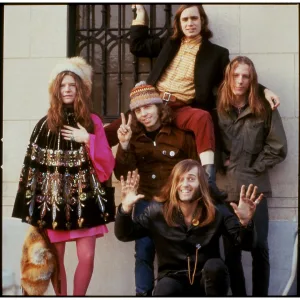 What was John Cipollina like on stage and off stage?
What was John Cipollina like on stage and off stage?
He was a character, I really liked him a lot. He was a “cool guy”, as they say (laughs). There are a lot of stories about John, some I can’t tell, but anyway, he was a gun collector and had a nice little studio in Marin County that we rehearsed at and he was a character. John played with fingerpicks, he didn’t play with a flat pick, that was unusual, at all. Yeah, it was fun playing with John, he was funny and he would tell stories every once in a while. But he had some funny songs that he would include or bring up, some songs that he would sing.
Jimi Hendrix’s music, George Harrison’s music, Santana’s music, had also a very strong spiritual aspect. Is today’s music spiritual?
I don’t think so. Even, back then I’m not sure if I would call it “spiritual”, but it was definitely psychedelic, which meant it was going into your head, thinking about things, going off on trips, as they would say.
Do you think because of the streaming services listening to an album from start to finish is now becoming a kind of lost art?
Gosh, that’s a good question. Maybe so, I haven’t talked to too many people about that and found out about their opinions about, because I think a lot of people like the streaming thing, they like to pick out the songs that they wanna hear and not necessarily listen to a whole album. So, whatever…
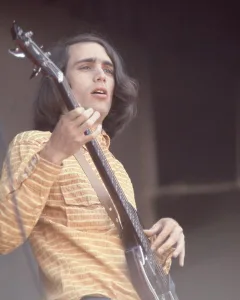 Is there any music documentary or autobiography by an artist that you enjoyed?
Is there any music documentary or autobiography by an artist that you enjoyed?
I enjoyed the one about Jimi Hendrix, that was kind of interesting, a documentary I think it was. What else? “Bohemian Rhapsody” (2018) about Freddie Mercury, that was an interesting movie. There are several of those movies out there and I’m not a movie goer, too much, because my wife doesn’t like to go to the movies; she’d rather stay home and watch TV, but we see some of these things on TV. As a matter of fact, I would mention if you can get it, there is a documentary called “San Francisco Sounds: A Place in Time Pt.1 & 2” (2023), which I believe it might be available on Netflix, I’m not sure, but I’ve shown that to a lot of people because I have that access to, here, at home. That retells the story of how underground music happened in San Francisco, how it blossomed and how it got a whole bunch of people interested in San Francisco musicians. So, I would recommend that, “San Francisco Sounds”.
Are you optimistic about the future of the psychedelic music?
It that still going on? (Laughs) I don’t know. I think that there is some of that stuff happening and I think it’s a throwback. There are some people who like that style still. I don’t listen to it too much because, like I said, I listen to jazz and classical music most of the time. So, I’m kind of odd that way, I guess.
How exciting is it to make model airplanes?
It’s fun, it keeps me going. I keep thinking of different models to make and I make a lot of models. In back of me, there is a bunch of models and over here there is a stockpile of boxes full of models to be made, one of these days, before I die, I’m gonna try to make them up (laughs)! It’s fun to fly them. There are models that you can fly indoors, so, I have flown some of my models off the back of my bass, into the audience. I’ve done that in Paris and here, yeah, it’s fun. I would write on the back of the wing what the venue was, what the date was and I sign my name.
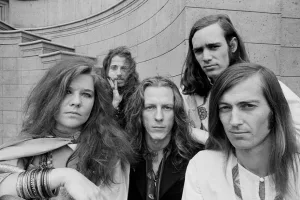 Had you ever met Jimi Hendrix?
Had you ever met Jimi Hendrix?
We met at Monterey Pop Festival, we met Jimi Hendrix there and we were going on for a second time on Sunday night (ed: Big Brother and the Holding Company performed twice at Monterey, on Saturday June 17 and Sunday June 18) and he was playing on the same bill with The Who. They were in the backroom both ready to go on and they were arguing about who was gonna go on first. Jimi Hendrix said: “I’ll go on first. You guys are the headliners, you go on after me” and they said: “No, no, no, no! We are gonna go on before you. You are the main guy” and he said: “No, I haven’t played in this country in years!” (Laughs). The argument went on and they flipped the coin, to find out who is gonna go on first and second. So, it was decided that he would go on second. Anyway, The Who put on one of their classic shows with the drums being tossed all over the place, smoke bombs, flares and crazy stuff and throwing the guitar around. Of course, then Hendrix had to do the same kind of thing, a makeshift one, so he had to burn his guitar on stage and throw it at the audience. If you watch the movie, “Monterey Pop” (1968), there are pictures of the audience and their faces were going: “Uh, what’s going on?” They couldn’t believe it, but it was fun working with him. A week afterwards, we substituted for Jefferson Airplane -because they had some other gig- at the Fillmore Auditorium, where Hendrix was second on the bill and first on the bill was the Airplane, but they had this other thing to do, so, we replaced them on that night and Hendrix was top of the bill.
Anyway, when he came in to the backroom, before the show, he said: “Where is the beer?” and we said: “Well, this is a club that allows young people, so there is no beer here”. He said: “I always have a beer before I go on!”, so, I said: “Well, I’ll take you to the supermarket down the street and we’ll get you some beer there and you can bring it back and sneak it in”. So, we went to this big supermarket and here is this Jimi Hendrix with all his epaulets, beads, wild hair and the hat on and the people in the Fillmore looked at him and said: “Who is this guy?! What the heck?! Who is this guy?! He’s pretty outrageous!” We got the beer and went back, that’s the end of the story, but basically he was drinking his beer and had a good time. He played at the Fillmore on Thursday night, that’s when we played with him and then on Friday and Saturday night they (ed: The Jimi Hendrix Experience) played at Winterland which was a bigger venue, in the same neighborhood, but they came back on Sunday and they played at the Fillmore. So, I heard a story that Janis went to see Jimi and went backstage before he went on and there was one bathroom backstage. She noticed that there was a line of girls in front of the door of the bathroom and she asked a guy: “What’s going on?” and the guy said: “Ah, Jimi is in the bathroom”. She said: “And these girls?” and he said: “Well…”. Then, she replied: “Oh!” So, I asked her later: “What did you do?” and she said: “Oh, I got in line” (laughs). So, you can imagine what was going on in the bathroom.
And she waited in line?
She waited in line (laughs), but we didn’t hear the rest of the story. She might not have gone in there because maybe he had to go on stage, I don’t know. That’s one of my weird stories.
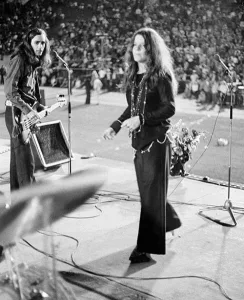 I like Tim Buckley a lot. Did you get to know him?
I like Tim Buckley a lot. Did you get to know him?
No, we didn’t, although he played on the same bill with us at the Fillmore East, in New York, but I do not remember meeting him and that was the same night that Albert King also played with us and we got a chance to meet him. He wanted to talk to Janis and he was an interesting guy. Yeah, he wanted to talk to Janis, he liked her (laughs). I was in the dressing room with Janis and then he came in and I left, so, I left them alone.
Do you have any memories from Jerry Garcia? You knew him before he formed Grateful Dead.
Oh, yeah. We knew him, I say “we”, my brother and me, knew him from the folk music days when we both played bluegrass and old-time music and so did Garcia. We had a little place called The Boar’s Head, which was operated in ’61 or ’62, a long time ago and Garcia was playing down in Palo Alto. His club was in the town that was a little bit further north, so, we went down to find Garcia at this bookshop called the Kepler’s and we got him to agree to come up and play at our place for free, basically. So, that was the beginning of our relationship with Garcia and Garcia’s friends like Bob Hunter and my brother became very good friends with Bob Hunter.
Did you hang out with him later when he became famous with Grateful Dead?
A little bit. We played at the same bill with the Grateful Dead quite a few times, so, we were in the same dressing rooms and on the same stage. Sometimes, he would come over to where I lived and sometimes I would be around on the house where they lived and I was good friends with “Pigpen”, Ron McKernan (ed: Grateful Dead -keyboards, vocals).
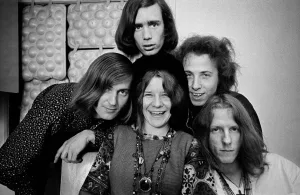 He had a relationship with Janis.
He had a relationship with Janis.
Yes, he did. When we were living in Marin County, he also lived there in the same town, it was, I guess, an old boys camp that was empty, so, some of the Grateful Dead lived there and it was close by, so, Janis and Pigpen would get together and drink, that’s what they liked to do and probably screw.
Would you like to tell us a few words about Phil Lesh (Grateful Dead – bass) who passed away a few months ago? Did you like him as person and as a bass player?
Yeah, I liked him as a bass player, he was a very good bass player. He went to the same junior college that I did and he was like the first trumpet in the orchestra or big band, he was a very good musician, but I didn’t know him in college. I only knew him later when he joined the Grateful Dead, but he lived close by and he was friends with my brother, also, friends of friends and whatever. Yeah, it was a close community in that time in Haight-Ashbury, so, I would see him every once in a while and he was a nice guy. Then, he moved up to Marin County, where I moved to. He even started his own club in Fairfax, it didn’t last very long, but I would see him there. Then, he started another club in San Rafael.
A huge “THANK YOU” to Mr. Peter Albin for his time.
Official Big Brother and the Holding Company website: https://www.bbhc.com/
Official Big Brother and the Holding Company Facebook page: https://www.facebook.com/BBHCband/

